#what is really important to understanding dick and cass is that their beef does not stem from a dislike of each other
Explore tagged Tumblr posts
Text
The thing about Dick and Cass is not only that Dick resents Cass' closeness to and understanding of Bruce, but that Cass resents Dick's closeness to and understanding of Babs. They both make each other feel insecure in their most fundamental relationships, which is why they fight so often, and why many of their fights feel one-sided. Essentially, they're mutually beefing with each other over different people, but because they'll never admit it neither of them ever know what the other is mad about.
#cassandra cain#dick grayson#bruce wayne#barbara gordon#2000s era dick cass was so fun#what is really important to understanding dick and cass is that their beef does not stem from a dislike of each other#they can't dislike each other. their problems stem from how much they idealise the other#idk might do a longer dive into what dick represents to cass in horrocks run because it is actually really interesting#suffice it to say that 2000s dick would've been online saying 'um actually cass is not bruce's daughter'#and cass would've been posting dickbabs hate everyday#(i actually think they love each other and get along but there will always be this history behind them which makes everything a bit bitter)
698 notes
·
View notes
Link
This story was reprinted with permission from the Ole Miss Alumni Review.
“What would you do tomorrow if you didn’t get paid for it?” is the question Mike Stewart (BPA 75, MCJ 78) of Oxford-based Wildrose Kennels challenges people to ask themselves when they want to know the secret of his success. They pick his brain because they know he pulled a complete career 180 with optimal results.
Today, Stewart, 60, certainly gets paid for what he pursued [he’s even graced the cover of Forbes magazine as the purveyor of a “recession-proof” business], but it didn’t happen overnight. You could say it’s been generations in the making.
“My father was a horse trainer and a really good one,” says Stewart. “But I’ve always gravitated to dogs.”
In high school, Stewart even wrote a biology paper on dog training, delving into dog behaviors.
“I think the teacher just let me get by with it because I couldn’t do anything else in biology,” he says. “I’ve always been blessed to live an outdoor lifestyle around animals. So many people today were born two and three generations away from the farm, so they’ve lost a lot of aptitude for how animals think and how they work. I grew up around animals, so I always had that in my back pocket.”
The back pocket he refers to was on a pair of rigid police uniform pants. The University of Mississippi grad went into law enforcement full-time in 1974 and spent seven years with the Oxford Police Department, working up from dispatcher to captain, before going to Ole Miss’ police department as chief of police in 1981. He also graduated from the FBI National Academy in 1989 and served in the U.S. Navy Reserve as a commander.
The entire time Stewart was in law enforcement, training dogs remained a hobby for him.
“I had beagles, treeing dogs,” he recalls. “I had obedience classes in town. I lived on Sisk then, and people would bring their dogs, and we’d work ’em. So, I’ve always worked with dogs, all the way back to junior high school. The interest has always been there and always been very keen.”
COPPING A NEW CAREER
In 1998, while chief of UPD, Stewart bought land east of Oxford, primarily, he says, to run beagles on. He soon ran a cattle business there and got into holistic gardening.
“I was always into the natural order of things and how crops grew, and grass-fed beef,” he says.
While dealing in cattle, he kept up his dog-training hobby, and he says these experiences with the natural way came to bear on his interest in dogs, to train them “in a more positive way — not using as much force but trying to take the natural ability of the dog, applying certain controls and then training the people to work their dogs better. It caught on.”
In the mid-’90s, Stewart found a kennel in Tennessee called Wildrose that was going out of business.
“I merged it with my operation here, and it took off fast enough that I had to get out of the cattle and get strictly into dog training,” he says.
But more than the cattle business would have to give.
“After that, I was faced with either cutting down on the dog side of things or retiring from Ole Miss,” says Stewart. “Most departments would open around 8 and be over at 5, whereas we ran around the clock, seven days a week. It was hard to get [the kennel business] going, so I faced leaving Ole Miss a little earlier than I anticipated. I enjoyed the work out there and the relationships, and things were going very well, but I couldn’t work all those shifts and keep up with all the manpower.”
In 2000, he made the break, and he hasn’t looked back.
His wife, Cathy, a former teacher who for 20 years directed the annual Faulkner and Yoknapatawpha Conference at Ole Miss, is his vice president of Wildrose Kennels. They live in a house within throwing distance of the Wildrose facility, on the same property. Stewart eases home for lunch or when he needs a little peace to work on what he’ll say as keynote speaker at various events for schools and groups.
THE WILDROSE WAY
Stewart has distilled his training methodology as “the Wildrose Way” and shares it with the hunting market on two DVDs and in one book, published last year.
“It’s our unique, balanced training philosophy,” he says. “We use a lot of positive reinforcement to engrain skills in the dog that are going to endure a lifetime.”
A pup, reporting to Stewart at around 8 months old, will stay an average of six months to experience the Wildrose Way — a dynamic curriculum to be sure.
“To be able to hunt upland in one minute and go down and handle duck hunting and hand signals on the water in another, that’s a lot to cover in five months, and most of them will stay about six,” Stewart says.
Wildrose focuses on one breed: British Labradors.
“All our genetics are original and authentic, imported from England and Northern Ireland,” Stewart says. “We breed them here and raise the pups. When I started, there was virtually nobody doing that — maybe one other kennel in the country. I had the only ad in Ducks Unlimited magazine in the 1990s; now there’s 16 to 18 ads. So, we’ve created divergence in the market. You’ve got the American Labrador and the British Labrador. When I started, there was no difference at all.”
Decades into honing his specific angle on Labs, Stewart knows what he wants.
“What we’re looking for in our dogs is their size, their athletic ability and their natural nose,” he says. “They’re a bit smaller and more compact than the average Labrador.”
Customers have options at Wildrose. Some buy “started” pups bred there — in black, yellow, chocolate or fox red — for $1,750 to $2,000. The owners then send them back to train. Others save some money by buying pups elsewhere and enrolling them at Wildrose for their education. Still others, willing to pay $12,000 to $15,000, get the “totally finished turnkey” job — buying a Wildrose-bred pup and leaving it with Stewart’s team until it’s 2 1/2 to 3 years old.
Certainly, to put it lightly, a customer must really enjoy hunting to outlay such an investment, and it’s no surprise Stewart says it’s worth the price. In the grand scheme of the hunting world, though, it does make sense.
“These dogs are not like bird dogs that you just take out and turn loose and kill some birds with them,” Stewart says. “These dogs live in your home and travel with you; they are 365-day dogs. When you look at it that way and you get around 10 years of companionship, and you amortize it out, it’s probably the cheapest thing the hunter owns — when you start looking at duck leases, fuel, corn and everything to produce the duck sites and hunt. It’s a pretty expensive hobby. The dog is probably only about $1 a day when you look at it.”
Oxonian and Ole Miss alum Bradley Rayner (BBA 00, BBA 02) got his “started” fox red Lab Nella as a pup from Wildrose and sent her back at 8 months of age for training for six months.
Rayner notes that the dogs aren’t the only ones getting an education.
“The things that Mike and his crew can accomplish with a dog are amazing,” Rayner says. “I know a number of people that have sporting dogs from Wildrose Kennels, and they are among the best in the field. The trainers work closely with you and play a critical role in your understanding of how to work your dog. The entire staff is friendly and willing to help you better your Wildrose dog, even after [the dog has] left training.”
You could say lifelong duck hunter Jeff Buckner, founder of financial planning firm Plancorp in St. Louis, is a believer in the Wildrose Way.
Buckner’s gotten three Wildrose Labs — one for himself, one for his son [who went to Ole Miss] and one for his grandson, so he’s more than qualified to be a part of a customer base he calls “the Wildrose community.” Buckner says his dog Rebel is the best duck dog at his club and swears the other members will vouch for him on that.
“Most of the non-Wildrose dogs I see in the field are pretty hyper and sometimes not very well-behaved in the blind, and that can be a problem,” says Buckner. “A big part of success in hunting is having total control over the dog.”
Buckner says Rebel has an “off switch” and can hang out at his office “with all the distractions going on without making a noise or disturbing anything, and then he’s capable of getting into the truck and going to the club and turning the switch back on in terms of high-powered performance in the field.”
Like Rayner, Buckner is a believer in the importance of the care Stewart takes to train owners.
Wildrose customers visit the Oxford facility for weekends at a time to learn how to properly handle their dogs. Stewart says being located in Oxford has worked out very well as an attractive community for folks from far away who are drawn to Wildrose.
Architect Heather Cass and her husband, Baltimore Ravens president Dick Cass, are both Yale graduates, so perhaps it’s natural that for a companion dog, they appreciate a Lab educated by the canine-training equivalent of an Ivy League professor.
Their last few dogs have been Labs, and a few years ago when her last Lab grew old, Heather Cass began contemplating how she could ever replace the beloved family member. The idea of starting over with a puppy in the home seemed daunting. That’s when she happened upon the Forbes article about Mike Stewart and Wildrose.
“I read it with interest, especially the part saying that they sell finished dogs,” Cass says. “One of the benefits of the whole investigation would be getting to come to Oxford because I’m a Faulkner fan and heard wonderful things about the town.”
About six months after the passing of her previous Lab in 2010, Cass visited Oxford and Wildrose Kennels.
She was floored by Stewart’s operation and impressed that he actually first asked her what she wanted out of a dog in her life. He invited her to check out one of his handler workshops so Cass could get to know the Stewarts, and they could get to know her, to better begin developing a plan for the right dog for her. She used one of their dogs in a workshop to get a feel.
“A few months later, Jack arrived in our life, and the rest is history,” Cass says. “We could not be happier with him but more importantly with the whole experience.”
BREEDING BUSINESS
In the mid-’90s, Stewart latched onto a succinct term: “Gentleman’s Gundog.” He picked up on it from a customer.
“I was training his dogs, and he mentioned that term one day,” Stewart says. “He was a stately gentleman with a big mustache. I thought, ‘I like that; I think I’ll keep it.’ It’s now the trademarked slogan of Wildrose Kennels, and Stewart says it helped gain his business a little more word-of-mouth.
“What kicked the can way down the road is when, in 2001, Ducks Unlimited gave us the contract for Drake, the first DU mascot,” Stewart says. “That was a huge long ball.”
The result was, Stewart says, that more people knew about Wildrose nationally in hunting circles than they did in Oxford. Drake now shows grey hair on his chin and is joined at Wildrose by Deke, the newer DU mascot.
“People come to Oxford and say, ‘We want to visit Wildrose,’ and people say, ‘What?’ They didn’t know where it was. Most [businesses] start locally and branch out; I did just the opposite.”
When Stewart retired from UPD in 2000, he had only one employee in his dog-training enterprise. He now has 14 to handle the many-pronged operation, including breeding puppies, training, running a full retail outfitter store on-site and an 1,800-square-foot vet-tech health care facility.
“Our vet-tech staff works from 6:30 in the morning to 9:30 at night, seven days a week.”
What’s more, Wildrose raises its own flight birds for training dogs. Five trainers come from different parts of the country. Some are Ole Miss alums, but the team includes staffers recruited from as far as Colorado and Wisconsin.
Originally, Wildrose’s scope was mostly breeding and some training, but training is now at least half of the operation.
“In the training, when we’re completely full, we manage about 100 dogs at one time,” Stewart says.
Training also isn’t limited to the Wildrose headquarters’ property in Lafayette County.
“We have now four facilities across the country. One is in northwest Arkansas on the Buffalo River, and we’re guests on a ranch in Colorado,” says Stewart. “The newest facility we just purchased … one of my partners and I are going to develop a duck-hunting operation in the Mississippi Delta. Each of those sites allows us to get realistic training for the dogs.”
In 2007, Stewart ventured outside the hunting dog paradigm, developing a training model for adventure dogs.
“That’s for people who don’t hunt that much, but the dogs complement a sporting lifestyle — hiking, biking, camping, canoeing.”
About five years ago came a third type of dog that Wildrose would produce: diabetic-alert dogs.
“We do a few of those, and it’s a nonprofit side of the company,” Stewart says of the Wildrose collaboration with the Tupelo-based CREATE Foundation.
THE OTHER SIDE
With all his success from what had been a lifelong hobby, Stewart offers some perspective from the other side for anyone mulling over the idea of turning a favorite hobby into a career.
“If you’re older in life and you want to follow a dream, and you have a passion — whether it’s a bicycle shop or pottery shop or whatever it is — get it going before you quit your day job,” he advises. “Do a good job there and get the other side going, and see if you can actually make a living at it. I was able to do that, and I was very fortunate.”
By Tad Wilkes. Photos by Nathan Latil.
This story was reprinted with permission from the Ole Miss Alumni Review. The Alumni Review is published quarterly for members of the Ole Miss Alumni Association. Join or renew your membership with the Alumni Association today, and don’t miss a single issue.
For questions, email us at [email protected].
Follow HottyToddy.com on Instagram, Twitter and Snapchat @hottytoddynews. Like its Facebook page: If You Love Oxford and Ole Miss…
The post Ole Miss Alumni Review: Lab Partner, How A Former UPD Chief Went To The Dogs appeared first on HottyToddy.com.
1 note
·
View note
Text
As much as I love Duke and Damian being the most adorable brothers ever, the tension between them is way underutilised. They both have very tenuous relationships to the Robin identity, and if you look at their interactions in Robin War, it's shot through with insecurity and dislike:

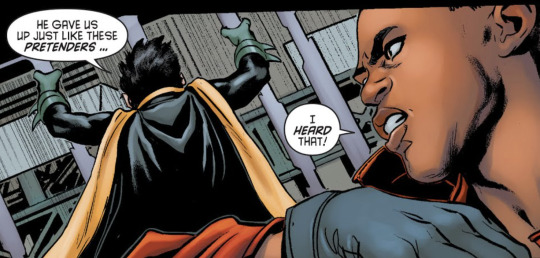
Specifically, Damian consistently refutes Duke's right to Robin. Robin War is the event that leads Duke to quitting Robin, and arguably he does this mostly because of Damian; Tim and Jason don't really interact with Duke, and Dick essentially endorses him. But the beef is not one-sided, because Duke consistently hits on Damian's insecurities as well:
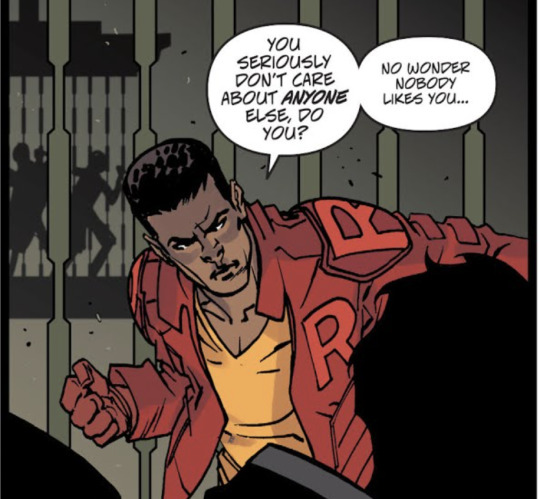

Damian belittles Duke's friends and entire cause; Duke highlights how unwanted and abandoned Damian is. They are simultaneous Robins with incompatible views of what Robin should be. Damian, fresh from his journey in Robin: Son of Batman, sees Robin as atonement, a link to Batman, and a representation of his personal growth; Duke, in the middle of We Are Robin, sees Robin as power, freedom from adult authority, and a representation of collective community.
The worst thing Damian can say about Duke is that his Robin is meaningless; the worst thing Duke can say about Damian is that his Robin is alone. They both say that to each other. And then, they both give up Robin:
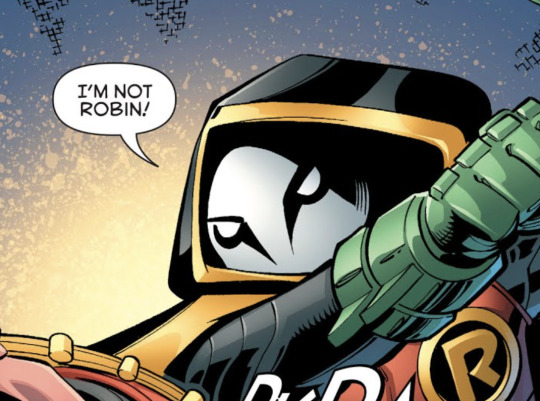
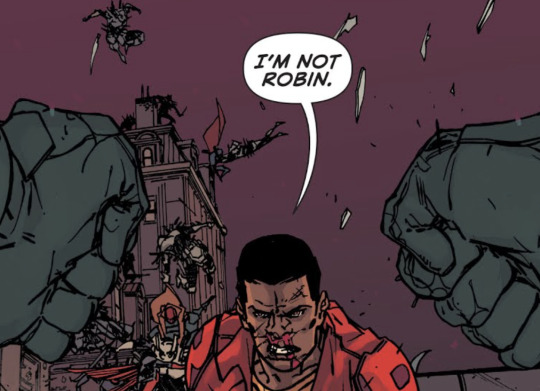
In Duke's case, he precedes saying "I'm not Robin" with "that's the difference between you and me." Their Robins are so wildly different, their ideals so opposed to each other, that they cannot co-exist as Robin. The risk of losing what Robin means to them, especially for Damian, fuels a lot of their early animosity.
This opposition continues in Batman & The Signal #1, where in Duke's dream sequence, there is only one person he imagines wanting to oust him from the family - Damian. But Bruce also pits Damian and Duke against each other in Batman: The Secret Files: The Signal, in Duke's favour:
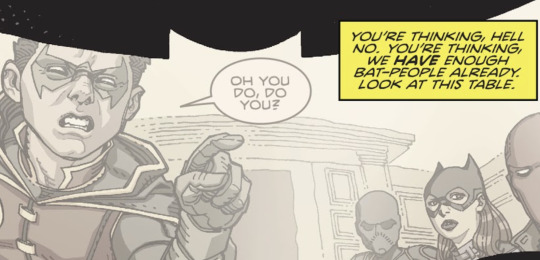

Bruce drags Damian down ('requires continuous supervision') to uplift Duke ('Gotham's best'). The writing in this comic is very questionable, but this is reminiscent of the way he talked to Cass about Steph in Batgirl (2000). Cass is the acceptable girl vs. Steph's unacceptable femininity; in a similar vein, Duke is the acceptable Batkid of colour, whereas Damian's heritage is 'inconvenient'.
Which is why it's all the more important that, despite everything, Damian and Duke do love each other.
Damian, despite all his (understandable) ambivalence and outward disdain towards Duke, pretty much spends the entire comic trying to save him:
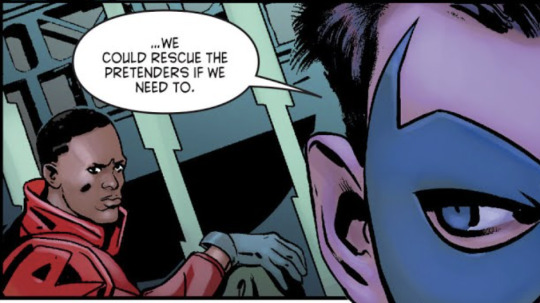
And Duke, when Damian defects to the Owls, staunchly refuses to believe he's gone for good. Tim and Jason also protest, but they get knocked out pretty quickly. It's Duke who refuses to give up on Damian. It's Duke who won't leave Damian alone.

Even though their Robins are complete opposites, Duke and Damian both know how big a deal it is to choose Robin; as the two Robins of colour (besides Dick, whose position is slightly different), they know how easily Robin can be taken away. It's why Duke, a virtual stranger, is the one to break through to Damian when nobody else could.

This panel from the end of Robin War hits so hard in context. Every interaction up until this point is antagonistic, and they have every reason to hate each other - but they don't. They choose not to. They choose to love each other instead.
#duke thomas#damian wayne#bruce wayne#batman#robin#dc LET THEM INTERACT MORE#meta#cobbling this post together with the 5 interactions they've had in canon#but genuinely their relationship is so fascinating in robin war. like having duke and damian paralleled so closely is SOOOO interesting#i didn't even mention the dg of it all#dick always at the scene of the robin meta crime#seriously tho. when damian sets off in robin: son of batman he's grieving dick's 'death'#and then when he comes back to gotham here's another robin. a whole bunch of robins. and duke gets dick's approval#if it wasn't new 52 the stuff we could've gotten with dick and damian.......
396 notes
·
View notes
Link
This story was reprinted with permission from the Ole Miss Alumni Review.
“What would you do tomorrow if you didn’t get paid for it?” is the question Mike Stewart (BPA 75, MCJ 78) of Oxford-based Wildrose Kennels challenges people to ask themselves when they want to know the secret of his success. They pick his brain because they know he pulled a complete career 180 with optimal results.
Today, Stewart, 60, certainly gets paid for what he pursued [he’s even graced the cover of Forbes magazine as the purveyor of a “recession-proof” business], but it didn’t happen overnight. You could say it’s been generations in the making.
“My father was a horse trainer and a really good one,” says Stewart. “But I’ve always gravitated to dogs.”
In high school, Stewart even wrote a biology paper on dog training, delving into dog behaviors.
“I think the teacher just let me get by with it because I couldn’t do anything else in biology,” he says. “I’ve always been blessed to live an outdoor lifestyle around animals. So many people today were born two and three generations away from the farm, so they’ve lost a lot of aptitude for how animals think and how they work. I grew up around animals, so I always had that in my back pocket.”
The back pocket he refers to was on a pair of rigid police uniform pants. The University of Mississippi grad went into law enforcement full-time in 1974 and spent seven years with the Oxford Police Department, working up from dispatcher to captain, before going to Ole Miss’ police department as chief of police in 1981. He also graduated from the FBI National Academy in 1989 and served in the U.S. Navy Reserve as a commander.
The entire time Stewart was in law enforcement, training dogs remained a hobby for him.
“I had beagles, treeing dogs,” he recalls. “I had obedience classes in town. I lived on Sisk then, and people would bring their dogs, and we’d work ’em. So, I’ve always worked with dogs, all the way back to junior high school. The interest has always been there and always been very keen.”
COPPING A NEW CAREER
In 1998, while chief of UPD, Stewart bought land east of Oxford, primarily, he says, to run beagles on. He soon ran a cattle business there and got into holistic gardening.
“I was always into the natural order of things and how crops grew, and grass-fed beef,” he says.
While dealing in cattle, he kept up his dog-training hobby, and he says these experiences with the natural way came to bear on his interest in dogs, to train them “in a more positive way — not using as much force but trying to take the natural ability of the dog, applying certain controls and then training the people to work their dogs better. It caught on.”
In the mid-’90s, Stewart found a kennel in Tennessee called Wildrose that was going out of business.
“I merged it with my operation here, and it took off fast enough that I had to get out of the cattle and get strictly into dog training,” he says.
But more than the cattle business would have to give.
“After that, I was faced with either cutting down on the dog side of things or retiring from Ole Miss,” says Stewart. “Most departments would open around 8 and be over at 5, whereas we ran around the clock, seven days a week. It was hard to get [the kennel business] going, so I faced leaving Ole Miss a little earlier than I anticipated. I enjoyed the work out there and the relationships, and things were going very well, but I couldn’t work all those shifts and keep up with all the manpower.”
In 2000, he made the break, and he hasn’t looked back.
His wife, Cathy, a former teacher who for 20 years directed the annual Faulkner and Yoknapatawpha Conference at Ole Miss, is his vice president of Wildrose Kennels. They live in a house within throwing distance of the Wildrose facility, on the same property. Stewart eases home for lunch or when he needs a little peace to work on what he’ll say as keynote speaker at various events for schools and groups.
THE WILDROSE WAY
Stewart has distilled his training methodology as “the Wildrose Way” and shares it with the hunting market on two DVDs and in one book, published last year.
“It’s our unique, balanced training philosophy,” he says. “We use a lot of positive reinforcement to engrain skills in the dog that are going to endure a lifetime.”
A pup, reporting to Stewart at around 8 months old, will stay an average of six months to experience the Wildrose Way — a dynamic curriculum to be sure.
“To be able to hunt upland in one minute and go down and handle duck hunting and hand signals on the water in another, that’s a lot to cover in five months, and most of them will stay about six,” Stewart says.
Wildrose focuses on one breed: British Labradors.
“All our genetics are original and authentic, imported from England and Northern Ireland,” Stewart says. “We breed them here and raise the pups. When I started, there was virtually nobody doing that — maybe one other kennel in the country. I had the only ad in Ducks Unlimited magazine in the 1990s; now there’s 16 to 18 ads. So, we’ve created divergence in the market. You’ve got the American Labrador and the British Labrador. When I started, there was no difference at all.”
Decades into honing his specific angle on Labs, Stewart knows what he wants.
“What we’re looking for in our dogs is their size, their athletic ability and their natural nose,” he says. “They’re a bit smaller and more compact than the average Labrador.”
Customers have options at Wildrose. Some buy “started” pups bred there — in black, yellow, chocolate or fox red — for $1,750 to $2,000. The owners then send them back to train. Others save some money by buying pups elsewhere and enrolling them at Wildrose for their education. Still others, willing to pay $12,000 to $15,000, get the “totally finished turnkey” job — buying a Wildrose-bred pup and leaving it with Stewart’s team until it’s 2 1/2 to 3 years old.
Certainly, to put it lightly, a customer must really enjoy hunting to outlay such an investment, and it’s no surprise Stewart says it’s worth the price. In the grand scheme of the hunting world, though, it does make sense.
“These dogs are not like bird dogs that you just take out and turn loose and kill some birds with them,” Stewart says. “These dogs live in your home and travel with you; they are 365-day dogs. When you look at it that way and you get around 10 years of companionship, and you amortize it out, it’s probably the cheapest thing the hunter owns — when you start looking at duck leases, fuel, corn and everything to produce the duck sites and hunt. It’s a pretty expensive hobby. The dog is probably only about $1 a day when you look at it.”
Oxonian and Ole Miss alum Bradley Rayner (BBA 00, BBA 02) got his “started” fox red Lab Nella as a pup from Wildrose and sent her back at 8 months of age for training for six months.
Rayner notes that the dogs aren’t the only ones getting an education.
“The things that Mike and his crew can accomplish with a dog are amazing,” Rayner says. “I know a number of people that have sporting dogs from Wildrose Kennels, and they are among the best in the field. The trainers work closely with you and play a critical role in your understanding of how to work your dog. The entire staff is friendly and willing to help you better your Wildrose dog, even after [the dog has] left training.”
You could say lifelong duck hunter Jeff Buckner, founder of financial planning firm Plancorp in St. Louis, is a believer in the Wildrose Way.
Buckner’s gotten three Wildrose Labs — one for himself, one for his son [who went to Ole Miss] and one for his grandson, so he’s more than qualified to be a part of a customer base he calls “the Wildrose community.” Buckner says his dog Rebel is the best duck dog at his club and swears the other members will vouch for him on that.
“Most of the non-Wildrose dogs I see in the field are pretty hyper and sometimes not very well-behaved in the blind, and that can be a problem,” says Buckner. “A big part of success in hunting is having total control over the dog.”
Buckner says Rebel has an “off switch” and can hang out at his office “with all the distractions going on without making a noise or disturbing anything, and then he’s capable of getting into the truck and going to the club and turning the switch back on in terms of high-powered performance in the field.”
Like Rayner, Buckner is a believer in the importance of the care Stewart takes to train owners.
Wildrose customers visit the Oxford facility for weekends at a time to learn how to properly handle their dogs. Stewart says being located in Oxford has worked out very well as an attractive community for folks from far away who are drawn to Wildrose.
Architect Heather Cass and her husband, Baltimore Ravens president Dick Cass, are both Yale graduates, so perhaps it’s natural that for a companion dog, they appreciate a Lab educated by the canine-training equivalent of an Ivy League professor.
Their last few dogs have been Labs, and a few years ago when her last Lab grew old, Heather Cass began contemplating how she could ever replace the beloved family member. The idea of starting over with a puppy in the home seemed daunting. That’s when she happened upon the Forbes article about Mike Stewart and Wildrose.
“I read it with interest, especially the part saying that they sell finished dogs,” Cass says. “One of the benefits of the whole investigation would be getting to come to Oxford because I’m a Faulkner fan and heard wonderful things about the town.”
About six months after the passing of her previous Lab in 2010, Cass visited Oxford and Wildrose Kennels.
She was floored by Stewart’s operation and impressed that he actually first asked her what she wanted out of a dog in her life. He invited her to check out one of his handler workshops so Cass could get to know the Stewarts, and they could get to know her, to better begin developing a plan for the right dog for her. She used one of their dogs in a workshop to get a feel.
“A few months later, Jack arrived in our life, and the rest is history,” Cass says. “We could not be happier with him but more importantly with the whole experience.”
BREEDING BUSINESS
In the mid-’90s, Stewart latched onto a succinct term: “Gentleman’s Gundog.” He picked up on it from a customer.
“I was training his dogs, and he mentioned that term one day,” Stewart says. “He was a stately gentleman with a big mustache. I thought, ‘I like that; I think I’ll keep it.’ It’s now the trademarked slogan of Wildrose Kennels, and Stewart says it helped gain his business a little more word-of-mouth.
“What kicked the can way down the road is when, in 2001, Ducks Unlimited gave us the contract for Drake, the first DU mascot,” Stewart says. “That was a huge long ball.”
The result was, Stewart says, that more people knew about Wildrose nationally in hunting circles than they did in Oxford. Drake now shows grey hair on his chin and is joined at Wildrose by Deke, the newer DU mascot.
“People come to Oxford and say, ‘We want to visit Wildrose,’ and people say, ‘What?’ They didn’t know where it was. Most [businesses] start locally and branch out; I did just the opposite.”
When Stewart retired from UPD in 2000, he had only one employee in his dog-training enterprise. He now has 14 to handle the many-pronged operation, including breeding puppies, training, running a full retail outfitter store on-site and an 1,800-square-foot vet-tech health care facility.
“Our vet-tech staff works from 6:30 in the morning to 9:30 at night, seven days a week.”
What’s more, Wildrose raises its own flight birds for training dogs. Five trainers come from different parts of the country. Some are Ole Miss alums, but the team includes staffers recruited from as far as Colorado and Wisconsin.
Originally, Wildrose’s scope was mostly breeding and some training, but training is now at least half of the operation.
“In the training, when we’re completely full, we manage about 100 dogs at one time,” Stewart says.
Training also isn’t limited to the Wildrose headquarters’ property in Lafayette County.
“We have now four facilities across the country. One is in northwest Arkansas on the Buffalo River, and we’re guests on a ranch in Colorado,” says Stewart. “The newest facility we just purchased … one of my partners and I are going to develop a duck-hunting operation in the Mississippi Delta. Each of those sites allows us to get realistic training for the dogs.”
In 2007, Stewart ventured outside the hunting dog paradigm, developing a training model for adventure dogs.
“That’s for people who don’t hunt that much, but the dogs complement a sporting lifestyle — hiking, biking, camping, canoeing.”
About five years ago came a third type of dog that Wildrose would produce: diabetic-alert dogs.
“We do a few of those, and it’s a nonprofit side of the company,” Stewart says of the Wildrose collaboration with the Tupelo-based CREATE Foundation.
THE OTHER SIDE
With all his success from what had been a lifelong hobby, Stewart offers some perspective from the other side for anyone mulling over the idea of turning a favorite hobby into a career.
“If you’re older in life and you want to follow a dream, and you have a passion — whether it’s a bicycle shop or pottery shop or whatever it is — get it going before you quit your day job,” he advises. “Do a good job there and get the other side going, and see if you can actually make a living at it. I was able to do that, and I was very fortunate.”
By Tad Wilkes. Photos by Nathan Latil.
This story was reprinted with permission from the Ole Miss Alumni Review. The Alumni Review is published quarterly for members of the Ole Miss Alumni Association. Join or renew your membership with the Alumni Association today, and don’t miss a single issue.
For questions, email us at [email protected].
Follow HottyToddy.com on Instagram, Twitter and Snapchat @hottytoddynews. Like its Facebook page: If You Love Oxford and Ole Miss…
The post Ole Miss Alumni Review: Lab Partner, How A Former UPD Chief Went To The Dogs appeared first on HottyToddy.com.
0 notes